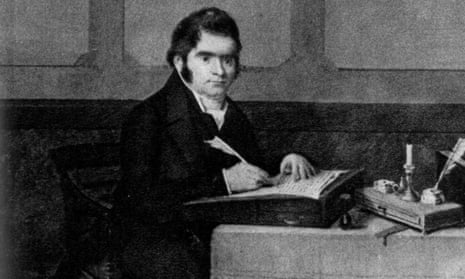Independent researchers have been commissioned by the Scott Trust, which owns the Guardian, to look into any historical connections the newspaper may have had to the slave trade.
The review will research any links between transatlantic slavery and John Edward Taylor, the journalist who founded the Manchester Guardian in 1821, as well as with his associates, their investments and business activities.
“We have seen no evidence that Taylor was a slave owner, nor involved in any direct way in the slave trade,” the chairman of the Scott Trust, Alex Graham, said in an email to staff on Friday.
“But were such evidence to exist, we would want to be open about it. In any event, we must acknowledge that as cotton and textile merchants, some of Taylor and his funders’ family businesses would almost certainly have traded with cotton plantations that used enslaved labour.”
Graham said that since the fall of the statue of the slave trader Edward Colston in Bristol, the Guardian and Observer had examined many organisations’ histories and called them to account for their connections to slavery and other past injustices. “It is right, therefore, that we look at our own, too,” he said.
Taylor was the son of a cotton merchant, and many of those who helped fund the new paper’s creation also worked in the textile and cotton trades in Manchester, then the centre of the cotton industry and known a Cottonopolis.
Graham wrote that in the decades after Taylor’s death, in 1844, the Manchester Guardian did not always adhere to progressive ideals and values – the paper sided with the slave-owning south in the American civil war.
“The Guardian of today took shape when Taylor’s nephew CP Scott, regarded as one of the greatest newspaper editors, took over in 1872. Scott transformed the Guardian, outlining the Guardian’s values in a 1921 essay, a blueprint for independent liberal journalism which has been central to our identity ever since,” he said.
“As Scott wrote, a newspaper must have a ‘a moral, as well as a material existence’. In 1936, after his death, CP Scott’s family established the Scott Trust, which still oversees the Guardian and the Observer, unlike the vast majority of national news publishers, which are owned either by shareholders or billionaires.”
Graham added: “All organisations must understand and discuss their histories, and it is particularly incumbent on media organisations to do so, reflecting on their past and current positions with openness, highlighting mistakes, and facing the future with humility.”
The review at the University of Nottingham will be led by Dr Sheryllynne Haggerty, an expert in the history of the transatlantic slave trade and the economy of the British empire.
Haggerty, director of the institute for the study of slavery at the University of Nottingham, who has published on the British slave trade and transatlantic commerce, said: “This is an important legacy project and it’s good to see a large British institution such as the Guardian explore its historical foundations and acknowledge any potential ties to transatlantic slavery.
“The Scott Trust, which governs the Guardian, has commissioned this independent report and has given us full access to the newspaper’s archives to assist our research on John Edward Taylor, the Manchester Guardian’s founding journalist in the early 19th century.”
Stephen Godsell, general counsel at Guardian News and Media, will liaise with the Nottingham team on behalf of the trust and the Guardian.
Graham said: “We will do our best to hold ourselves to account, just as we do others, and the work will be shared with staff and our readers, once complete. It is incumbent on all of us to examine our histories, understand the injustices which have disadvantaged some and benefited others – and then act, in the present day, in ways which actively encourage progress, not hold it back.”










